pioneer
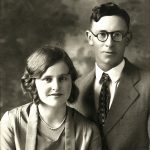
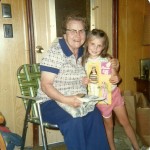 My husband, Bob Schulenberg’s grandmother, Nettie Knox was not born during the pioneer era, but she did live a life that mirrored that era to a degree. While she was born in the West, in Clydes Park, Montana, she was nevertheless, a kind of pioneer woman. Grandma was born on June 30, 1909 to Orin and Eva (Landis) Noyes, and married Robert Knox on June 14, 1928. She was not born before cars were invented, but sometimes she lived like she was in the Old West. Grandpa was worked on a sheep ranch, and for a time when my mother-in-law, Joann Schulenberg was a little girl of about 3 years, they lived in a sheep wagon. The shepherd needed to be near the sheep, and Grandma was a homemaker, so she went with him. Plus, the sheep wagon was provided to them free of charge, and you don’t turn down a rent free place to live. Of course, that wasn’t where they lived for very long, because even with just the three of them for the first 15 years of her life, living in a sheep wagon would not really be roomy enough.
My husband, Bob Schulenberg’s grandmother, Nettie Knox was not born during the pioneer era, but she did live a life that mirrored that era to a degree. While she was born in the West, in Clydes Park, Montana, she was nevertheless, a kind of pioneer woman. Grandma was born on June 30, 1909 to Orin and Eva (Landis) Noyes, and married Robert Knox on June 14, 1928. She was not born before cars were invented, but sometimes she lived like she was in the Old West. Grandpa was worked on a sheep ranch, and for a time when my mother-in-law, Joann Schulenberg was a little girl of about 3 years, they lived in a sheep wagon. The shepherd needed to be near the sheep, and Grandma was a homemaker, so she went with him. Plus, the sheep wagon was provided to them free of charge, and you don’t turn down a rent free place to live. Of course, that wasn’t where they lived for very long, because even with just the three of them for the first 15 years of her life, living in a sheep wagon would not really be roomy enough.
Grandma loved tradition, Christmas, birthdays, and celebrations in general, but when my daughter, Corrie Petersen was born on her birthday, and she was her first great grandchild, Grandma was ecstatic!! She considered that to be the greatest git ever, and they always had a strong bond. They always celebrated that birthday together, and new pictures were taken every year to see how much they had both changed. Of course, to me it seemed that it was Corrie did the changing. She was the one that was growing up, and Grandma seemed to have a timelessness about her. In fact, it seemed like she had an innocence about her. Maybe it was her love of tradition and celebration, or maybe she was just blessed with good genes. Whatever it was, Grandma just never seemed to get old…to me at least. Maybe that was why Grandma and Corrie could have such a great relationship too. They could both get excited about the same kinds of things.
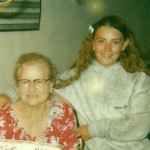
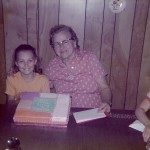 When I think of what Corrie is working on becoming, and has already become, I know that Grandma Knox would have been so proud of her. Grandma suffered with arthritis and always whiced that the medical community could find a cure for it. While there is no cure yet, maybe there will be someday. Nevertheless, Corrie tries to comfort people, no matter what the disease is that they have. Her job is is give comfort to her patients, and I know that Grandma would have seen that as a great contribution to the world. Today is the 113 anniversary of Grandma’s birth. Happy birthday in Heaven, Grandma. We love and miss you very much.
When I think of what Corrie is working on becoming, and has already become, I know that Grandma Knox would have been so proud of her. Grandma suffered with arthritis and always whiced that the medical community could find a cure for it. While there is no cure yet, maybe there will be someday. Nevertheless, Corrie tries to comfort people, no matter what the disease is that they have. Her job is is give comfort to her patients, and I know that Grandma would have seen that as a great contribution to the world. Today is the 113 anniversary of Grandma’s birth. Happy birthday in Heaven, Grandma. We love and miss you very much.
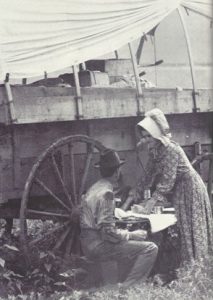 When we think of the Old West, the Pioneer movement, the Gold Rush, and generally, the settling of the United States, our minds immediately go to the brave men who fought the Indians, ran the wagon trains, weathered the harsh winters looking for their fortunes, and fought in the wars to make this a free nation, but seldom do we think of the anonymous heroes of that time…the women. There is a saying, “Behind every great man there’s a great woman.” that saying is one reference to the many women who have set aside their own comforts to support their man in the goals and dreams he has. In many ways that saying is the picture of the Pioneer woman, but it actually leaves something out. Just because her man did not become famous, doesn’t mean that the woman was any less behind him, supporting him in all he did.
When we think of the Old West, the Pioneer movement, the Gold Rush, and generally, the settling of the United States, our minds immediately go to the brave men who fought the Indians, ran the wagon trains, weathered the harsh winters looking for their fortunes, and fought in the wars to make this a free nation, but seldom do we think of the anonymous heroes of that time…the women. There is a saying, “Behind every great man there’s a great woman.” that saying is one reference to the many women who have set aside their own comforts to support their man in the goals and dreams he has. In many ways that saying is the picture of the Pioneer woman, but it actually leaves something out. Just because her man did not become famous, doesn’t mean that the woman was any less behind him, supporting him in all he did.
Pioneer women were there, on the home front, working hard all day trying to keep their house clean in a rugged windswept frontier. Her floors were often made of dirt, and yet she swept them. The water came from a well, or a nearby creek, and she had to haul it into the house, because her man was off hunting to bring in food for the family. The house was crudely constructed with logs and often had a sod roof, and she was right there working like a man beside her husband to get that house built. She watched over the children, and kept them safe from the many perils that were a daily encounter. From snakes, to bears, to mountain lions, to Indians, she did what she needed to, even to the point of handling a gun as well as her husband did. And yet, history looked at her as the weaker part of the partnership, the one who needed to be sheltered and protected. History looked at her as if she could not 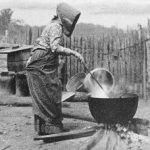 even bear to hear about certain things, because they might be too upsetting to her. In reality, they had vastly underestimated their women.
even bear to hear about certain things, because they might be too upsetting to her. In reality, they had vastly underestimated their women.
When the men got hurt, and the garden needed to be cared for, the women would till the ground…fighting with the tiller behind a horse, and winning the battle. These women took care of the house, the children, the sick or injured husband, and the garden or other crops, all without batting an eye. These women knew all about the hardships of frontier living, and when the going got tough, they didn’t turn and run back east. When the Indians attacked, they stayed and fought with their men. They could not afford to hide in a cellar, their hands were needed to hold a gun. They even faced the Indians alone, when their men were away, becoming excellent negotiators, who were able to make a trade of their wares that, in the end saved their own lives and the lives of their families. They were determined to make this new frontier work, and for the most part, they did it all without making a name for themselves. Sometimes, when we look up ancestors in historic archives, these women are either listed only as Mrs, acknowledging only the husband’s name, or they were listed only as the wife of their husband. Their true identity sometimes remains forever a mystery, and yet, they were heroes…but, they were anonymous heroes. The great men they stood behind, thereby making these men successful, may have been heroes of the frontier, and their name may have been one that every history book told us all about, 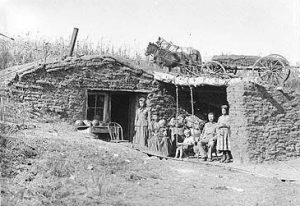 but their wives, who worked quietly beside them, remained unknown. We knew about the exploits of the men, the towns they founded, the travels they made exploring ever westward, but the women who were there with them, cooking the meals while the men talked, cleaning up afterward alone, delivering their babies often with only the help of their husband, carrying a baby, while weeding a garden, and feeding their family before themselves, going hungry, if necessary, to make sure the family was taken care of…these women rarely made the history books. Their job must have seemed to mundane to be considered adventurous, but without their contribution, this nation would not have become the great Republic that it is.
but their wives, who worked quietly beside them, remained unknown. We knew about the exploits of the men, the towns they founded, the travels they made exploring ever westward, but the women who were there with them, cooking the meals while the men talked, cleaning up afterward alone, delivering their babies often with only the help of their husband, carrying a baby, while weeding a garden, and feeding their family before themselves, going hungry, if necessary, to make sure the family was taken care of…these women rarely made the history books. Their job must have seemed to mundane to be considered adventurous, but without their contribution, this nation would not have become the great Republic that it is.
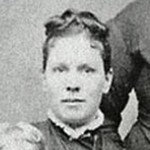 I have always been one to read the obituaries in the paper. Sometimes, I find that the deceased is someone I know, or that their family is someone that I know. I suppose many people might think it odd that I read the obituaries, but in searching my family tree, I find that they can be a wealth of information into the life of that person. I have been able to clarify children’s names, parents names, and siblings names, just by looking at the obituaries of my ancestors. I have also found out for sure, who their parents and even grandparents were by reading their obituaries. Things like place of birth, and early childhood years and locations are listed there, as well as, careers, hobbies, club memberships, and homestead information, along with place of birth and death, and even burial. It is clearly a wealth of information that, to the genealogist, is pure gold, because so often, information was not well kept. Names were left off, dates, and even who the person was related to. It makes it very difficult to search.
I have always been one to read the obituaries in the paper. Sometimes, I find that the deceased is someone I know, or that their family is someone that I know. I suppose many people might think it odd that I read the obituaries, but in searching my family tree, I find that they can be a wealth of information into the life of that person. I have been able to clarify children’s names, parents names, and siblings names, just by looking at the obituaries of my ancestors. I have also found out for sure, who their parents and even grandparents were by reading their obituaries. Things like place of birth, and early childhood years and locations are listed there, as well as, careers, hobbies, club memberships, and homestead information, along with place of birth and death, and even burial. It is clearly a wealth of information that, to the genealogist, is pure gold, because so often, information was not well kept. Names were left off, dates, and even who the person was related to. It makes it very difficult to search.
In the case of my 2nd great aunt, Theresa “Tessie” Elizabeth Spencer Davis, I found a wealth of information in her obituary, when I came across it in my Uncle Bill Spencer’s family history information. She was born, the 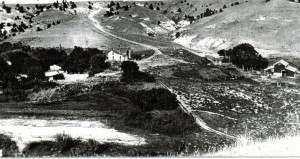 seventh child of my 3rd great grandparents, Allen and Lydia Spencer, on October 8, 1864, in Brooklyn, Iowa. Her parents had a family of nine children in total. She married William Jonathan Davis on September 29, 1883, in Webster City, Iowa, and in 1888, She and her family became pioneers, when they moved out west to Nebraska. They first moved to Crookston, later to For Robinson, and in 1892, the homesteaded in Pine Creek, where they lived until their retirement, at which time they moved into Rushville, having given the homestead to their children. William preceded Tessie in death in 1925…so many losses to endure.
seventh child of my 3rd great grandparents, Allen and Lydia Spencer, on October 8, 1864, in Brooklyn, Iowa. Her parents had a family of nine children in total. She married William Jonathan Davis on September 29, 1883, in Webster City, Iowa, and in 1888, She and her family became pioneers, when they moved out west to Nebraska. They first moved to Crookston, later to For Robinson, and in 1892, the homesteaded in Pine Creek, where they lived until their retirement, at which time they moved into Rushville, having given the homestead to their children. William preceded Tessie in death in 1925…so many losses to endure.
Life was never easy for Tessie. she lost siblings, as well as, seven of her eleven children before her own death…many of them young. She was the last of her siblings to pass away, and she outlived her husband by almost twenty years. The obituaries of the past listed even more information. Tessie was Methodist, and she belonged to the American Legion Auxiliary. She also belonged to a group called Royal Neighbors…she was a 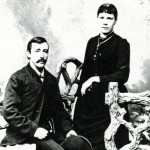 charter member. And she was a Gold Star Mother, but I’m not sure what that was for sure. The thing that stuck out for me the most, however, was that Tessie was a pioneer. The writer of the obituary said that, “In her passing, another pioneer has gone to the great beyond having courageously and triumphantly overcome the hardships, privations, and trials of the early settler that has made it possible for this generation to live the more modern life such as was not known to the pioneer. She was generous and hospitable, never thinking of herself, but often going out of her way to help a friend.” With everything that I learned about my 2nd great aunt, those words were by far the most amazing. They told of who she really was…deep inside. And Tessie Spencer Davis was simply an amazing woman.
charter member. And she was a Gold Star Mother, but I’m not sure what that was for sure. The thing that stuck out for me the most, however, was that Tessie was a pioneer. The writer of the obituary said that, “In her passing, another pioneer has gone to the great beyond having courageously and triumphantly overcome the hardships, privations, and trials of the early settler that has made it possible for this generation to live the more modern life such as was not known to the pioneer. She was generous and hospitable, never thinking of herself, but often going out of her way to help a friend.” With everything that I learned about my 2nd great aunt, those words were by far the most amazing. They told of who she really was…deep inside. And Tessie Spencer Davis was simply an amazing woman.
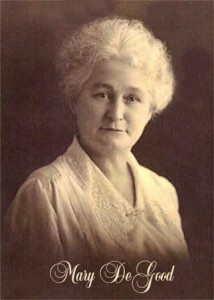 Since the beginning of this country, its citizens have been moving. We are a nation of pioneers. We came from many other countries to start a new life in a new land, and we seldom settle down in the place where we started, although, some do. Some of the pioneers in this country seemed, almost out of place in their new surroundings. When I look at pictures of some of my family’s ancestors, such as Mary DeGood, my husband’s great great grandmother, I see a woman, who had the innocence of many people had who started out life in the eastern part of our country, and later a strength that comes from living in the west. Many pioneer women seemed to take on the roughness of the west when they moved in the mid to late 1800’s, and there is nothing
Since the beginning of this country, its citizens have been moving. We are a nation of pioneers. We came from many other countries to start a new life in a new land, and we seldom settle down in the place where we started, although, some do. Some of the pioneers in this country seemed, almost out of place in their new surroundings. When I look at pictures of some of my family’s ancestors, such as Mary DeGood, my husband’s great great grandmother, I see a woman, who had the innocence of many people had who started out life in the eastern part of our country, and later a strength that comes from living in the west. Many pioneer women seemed to take on the roughness of the west when they moved in the mid to late 1800’s, and there is nothing 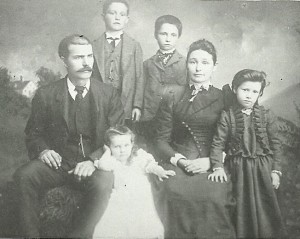 wrong with that, because it took a tough woman to make it in the west, just like it took tough men to make it in the west. Many of the people who came out west, couldn’t make it. They didn’t have the strength of character, or the physical stamina to handle this rugged country. Those who weren’t tough enough, went back home.
wrong with that, because it took a tough woman to make it in the west, just like it took tough men to make it in the west. Many of the people who came out west, couldn’t make it. They didn’t have the strength of character, or the physical stamina to handle this rugged country. Those who weren’t tough enough, went back home.
Bob’s great great grandmother had those qualities, and many people seemed to realize it, because she was well known and respected in the town of Prosser, Washington. It isn’t often that a woman is considered a pioneer in a community, but she was. Mostly, it is the men we think of when we think of pioneers, but 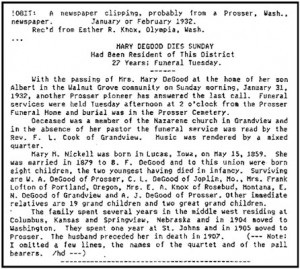 where would those men have been without their wives. While they probably wouldn’t admit it to their wives and families. They were the main reason men headed out west…to find a better life for them and their families.
where would those men have been without their wives. While they probably wouldn’t admit it to their wives and families. They were the main reason men headed out west…to find a better life for them and their families.
Still, it was a rare man who really made a good life in the west alone. They may have started out alone, but before long they knew they didn’t want to go on alone. That was a wise man for sure. Bob’s great great grandparents married and soon headed out west, finally settling in Prosser,Washington. The people of Prosser considered them to be pioneers of their town. They were respected and revered, and upon their passing, they were given a pioneer’s send off. A pioneer’s last call.
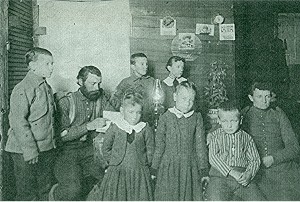 Back in the late 1800’s, life in the United States was rugged, especially if you didn’t live in the East. The people who lived here had a pioneer spirit, and they were used to making their own way. That didn’t necessarily mean that they were poor, although some lost everything they had. The amazing thing about that is that even if they did lose everything, many of them found a way to start over, and didn’t move back to the East.
Back in the late 1800’s, life in the United States was rugged, especially if you didn’t live in the East. The people who lived here had a pioneer spirit, and they were used to making their own way. That didn’t necessarily mean that they were poor, although some lost everything they had. The amazing thing about that is that even if they did lose everything, many of them found a way to start over, and didn’t move back to the East.
It was that pioneer spirit in those early settlers of this nation. They proved they had what it took to make a life in a rugged and sometimes brutal land, that they had the guts to turn this land into the great nation it is today. There are still people out there like that today. People like my cousin, Shirley and her family who live in the mountains of Washington state, and when I say they live there, I mean they live mostly off the land. They hunt and fish, and they grow a garden. That pioneer spirit still lives strong in them.
Our Great Grandpa And Grandma Spencer raised their 6 children in various places, but at this point in their lives, they were living near Rock Falls, Wisconsin, the old O’Dell place, which is another thing I find funny. It seems like once a family lives on a place, it always belongs to them, or at least their name always belongs to the place. So, no matter how many families followed the O’Dell’s, the house would always carry their name. That was a tradition I never could figure out, but it still seems to be the case.
Our great grandparents and great great grandparents built this country with their blood, sweat and tears, and most importantly with pure gut! They had what it takes to make it in a land that could be brutal enough to kill a man, much less a woman, if they weren’t strong enough.
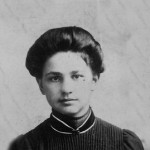 Life in the early 20th century was not always easy. Many people were on the move westward, hoping to find a better life, as things were much more crowded in the east, and land was not readily available. The government was giving away homesteads in Montana, so that is where Bob’s great grandfather decided to move his young family. It took men and women of strong constitution to settle the west, both during the wild west and into the 20th century. Bob’s great grandmother, Julia Doll Schulenberg was one of those strong pioneer women. She was always a hard working woman, and when times got tough, Julia Schulenberg shined. She was a woman capable of doing just about any job required to help her family survive. In addition to running the homestead, farming and caring for livestock and children, she cleaned houses in Forsyth, worked in the cafe, and even served as a midwife to the area women. She did what she had to do to save their homestead during the tough times.
Life in the early 20th century was not always easy. Many people were on the move westward, hoping to find a better life, as things were much more crowded in the east, and land was not readily available. The government was giving away homesteads in Montana, so that is where Bob’s great grandfather decided to move his young family. It took men and women of strong constitution to settle the west, both during the wild west and into the 20th century. Bob’s great grandmother, Julia Doll Schulenberg was one of those strong pioneer women. She was always a hard working woman, and when times got tough, Julia Schulenberg shined. She was a woman capable of doing just about any job required to help her family survive. In addition to running the homestead, farming and caring for livestock and children, she cleaned houses in Forsyth, worked in the cafe, and even served as a midwife to the area women. She did what she had to do to save their homestead during the tough times.
When her oldest child, Andrew…Bob’s future grandfather, accidentally shot himself in the leg at age 15, and subsequently spent 2 years in the hospital, losing his leg about a year into his stay, Julia and her husband Max would pull him through it. They had passed their strength on to their children, showing them how to survive in the rugged west, even during the worst of times. Andrew would be no exception to that rule. With hard work and stubborn determination, Andrew would recover, and while he had a wooden leg, he went on to become the sheriff of Rosebud County, Montana for many years. He would also go on to marry Bob’s grandmother, and later, after their divorce, he would narry again and would be largely out of his son, my father-in-law’s life for all but the last few years before his death in 1986.
While Bob’s dad did not have much association with his dad until much later in life, he has very fond memories of his grandmother…Julia Doll Schulenberg. It would seem that Julia was, in all reality, the backbone of the Schulenberg family. While Max seemed to struggle to get by, and went from job to job, Julia was of very strong stock. She taught her children to work hard, and do what was right, and also passed those good qualities on to her grandchildren. My father-in-law remembers her as a hard working woman, who kept a 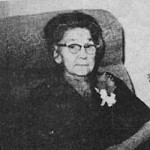 clean home and always welcomed him in for a visit. He has based much of his view of a good woman on the amazing example his grandmother gave him.
clean home and always welcomed him in for a visit. He has based much of his view of a good woman on the amazing example his grandmother gave him.
While her husband, Max would die and the young age of 56, Julia Doll Schulenberg lived a long life. She passed away on November 17, 1974, at 89 years of age. Her death came just 4 months before I married Bob, so I never got to meet her. Still, from my father-in-law’s stories of his grandma, I know that she was a woman of strong constitution and a kind, loving spirit, and the fact that I never met her is most definitely my loss.

